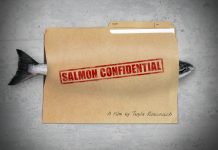In “The End Of The Line,” audiences are confronted with an urgent and deeply unsettling issue that has largely evaded the public eye: over-fishing. This powerful documentary shines a stark spotlight on a problem that has far-reaching consequences for our planet, exposing the ominous trajectory we are hurtling towards.
At its core, “The End Of The Line” tackles the devastating effects of over-fishing, a predicament exacerbated by the relentless march of fishing technology. This relentless advancement has ushered in a new era where entire species of wild fish teeter on the brink of extinction. Moreover, the most crucial fish stocks that sustain our diets are now at the precipice of collapse, with a grim forecast predicting their depletion by the year 2050.
The film presents a stark juxtaposition between the awe-inspiring beauty of our oceans and the brutal reality of their exploitation. It is a wake-up call that prompts viewers to contemplate the delicate balance that sustains life beneath the waves and the repercussions of our actions on this fragile ecosystem.
“The End Of The Line” serves as a stark reminder of how interconnected our planet’s ecosystems are. The over-fishing crisis reverberates not only through our oceans but also across the global food chain, affecting communities and economies around the world. As the film deftly unfolds, it becomes apparent that the consequences of unchecked fishing are not limited to the depletion of fish stocks; they encompass wider issues such as food security, livelihoods, and environmental stability.
One of the film’s most compelling aspects is its exploration of the human impact on this crisis. Through interviews with experts, scientists, and individuals directly affected by over-fishing, viewers gain insight into the multifaceted dimensions of this global problem. The documentary goes beyond the statistics and data to humanize the issue, making it all the more relatable and immediate.
Additionally, “The End Of The Line” provides a thought-provoking examination of the role of consumer choices in shaping the future of our oceans. It invites viewers to reflect on their own dietary decisions and the power they hold in mitigating the crisis. By highlighting the importance of sustainable fishing practices and responsible consumption, the film empowers individuals to be part of the solution.
Visually, the documentary is a breathtaking ode to the underwater world. Stunning cinematography captures the vibrant diversity of marine life and the awe-inspiring majesty of our oceans. These moments of natural beauty serve as a poignant backdrop to the narrative, underscoring what is at stake if we continue down the path of over-fishing.
In conclusion, “The End Of The Line” is a sobering and eye-opening documentary that confronts us with the uncomfortable truth about the state of our oceans. It is a call to action that implores us to consider the consequences of our unchecked exploitation of marine life and the urgent need for sustainable practices. This film is not merely a warning; it is a rallying cry for collective responsibility and informed decision-making.
As we peer into a future where the very fish that sustain us may vanish from our plates, “The End Of The Line” compels us to ask ourselves a critical question: What legacy do we want to leave for future generations? This documentary is a compelling and essential watch, a testament to the power of film to shine a light on critical issues that demand our immediate attention.

































